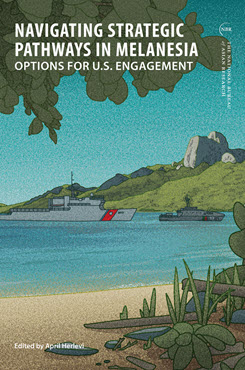Essay in NBR Special Report 110
U.S. Strategy in Melanesia
Pacific Security through Integrated Diplomatic Engagement
This essay examines U.S.-China geopolitical competition within the context of their foreign policy approaches to Melanesia and considers options for future policy actions.
EXECUTIVE SUMMARY
MAIN ARGUMENT
The U.S. views China’s presence and influence in Melanesia as a contestation of its power in the Pacific due to China’s continuing rise and—as Washington sees it—belligerent and aggressive military and foreign policy. Beijing, for its part, sees the region as necessary to its foreign policy objectives, which include cultivating governments for political ends, acquiring natural resources, and maintaining trade, commercial, and shipping access. It does not, however, necessarily perceive Melanesia as a place in which to engage in strategic competition with the U.S. The U.S. needs to reframe its perceptions of Chinese activities in the region and provide diplomatic solutions for the region in order to build enduring relationships that support U.S. national security interests.
POLICY IMPLICATIONS
- China’s engagement with Melanesia has been substantial, involving both official government assistance and unofficial development assistance. Although Washington perceives these activities through the prism of the evolving great-power competition between the two countries, a review of Chinese activities indicates that Beijing’s motives are primarily economic and political. U.S. responses should address these realities rather than attributing military motives to China.
- Currently, the perception within Melanesia is that U.S. interests in the region are shallow and driven by China’s growing influence. If the U.S. wants to bring Melanesia into alignment with its broader Indo-Pacific strategy, Washington must prioritize fostering enduring relationships with individual countries.
- The U.S. government can foster enduring relations by actively engaging in substantive dialogues with host governments and civil society to address the concerns and priorities of Melanesian nations. By doing so, the U.S. can show that it is a reliable partner in the region and not merely there to contest Chinese influence and power.
- By focusing on diplomatic programming to improve country capacities for governance, economic development, and security, the U.S. can not only build strong partnerships but also gain credible regional support for a rules-based order.
Yan Bennett is Professorial Lecturer at the George Washington University, where she teaches diplomatic studies, international law, and organizations. She is also Deputy Chair of Global Issues in the School of Professional and Area Studies at the Foreign Service Institute, where she teaches courses that prepare U.S. diplomats for foreign policy implementation. Her views are her own and do not express the views or opinions of her employers.


